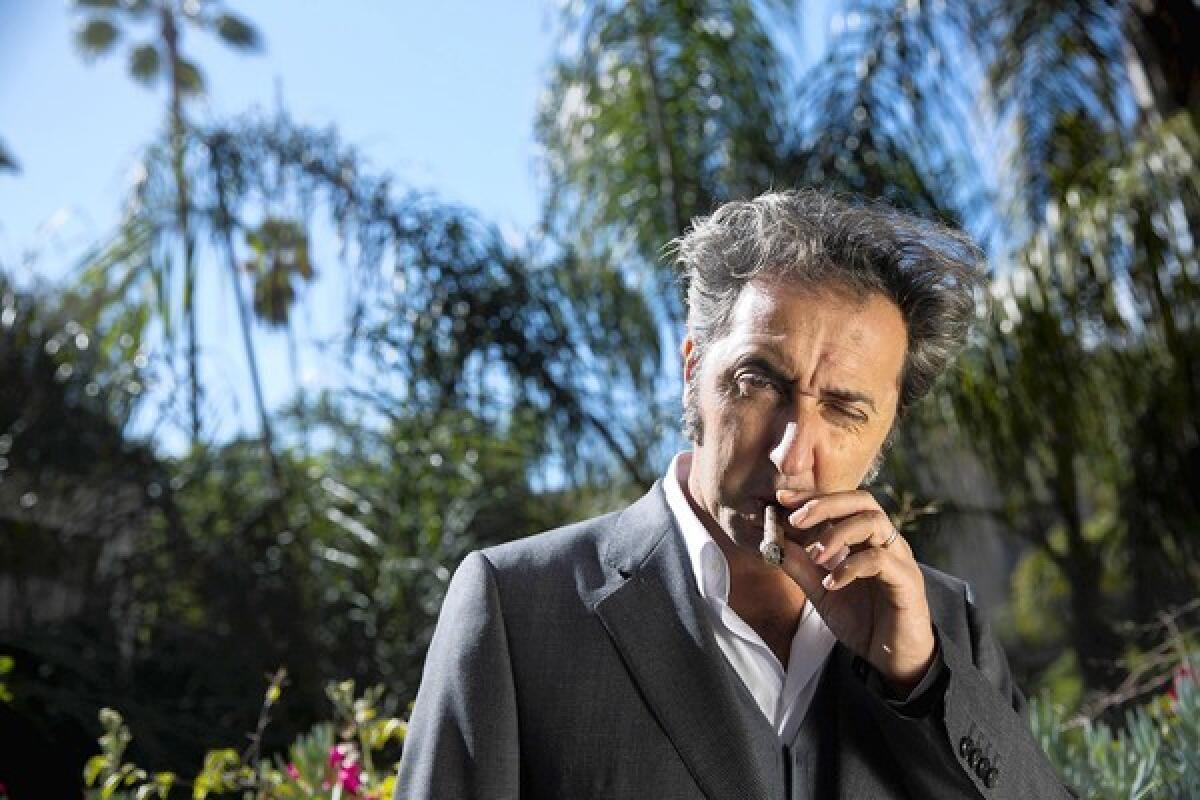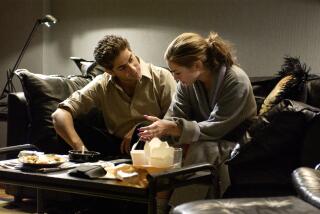‘The Great Beauty’ follows a misanthrope in modern Rome

- Share via
Opening on package-tour views of classical Italian architecture set against lilting choral music, “The Great Beauty” abruptly cuts to a screaming Roman disco party swarming with distorted glamour. The disorienting bacchanal is the 65th birthday party for the protagonist, a man named Jep Gambardella, and the camera lands on the louche, implacable landscape of his face.
The point of view soon shifts to that of a grand vista, placing the party’s swirling throb against the stillness of the city’s nighttime skyline. Directed by Paolo Sorrentino, the film shifts from the detailed to the panoramic to frame “The Great Beauty” as both a character study and a big-picture view on contemporary Italy.
The film is an examination of potential unfulfilled and squandered, with the pursuit of momentary pleasures a salve against deeper wounds. It mixes a phantasmagoric, oblique critique of the excesses of Italy’s recent past under former Prime Minister Silvio Berlusconi with an affectionate unstated tribute to the peculiar, exuberant imagery of Italy’s cinematic maestro, Federico Fellini.
“Obviously the Berlusconi era is something that has been around for 20 years, and maybe it kind of contaminated the film, it’s the kind of backdrop to what’s going on in Italy,” said Sorrentino, 43, during a recent stop in Los Angeles. “But that wasn’t the point.”
After its premiere at the Cannes Film Festival, the film went on to play at the Toronto Film Festival as well as the recent AFI Fest in Los Angeles. Italy’s submission for this year’s foreign-language Oscar, the film opens in Los Angeles on Nov. 22.
Though the character of Jep Gambardella, brought to vivid life by the director’s frequent star Toni Servillo, is not based on any specific person, he has the ring of a familiar type. Sorrentino and his co-writer Umberto Contarello worked from years of notes and observations to concoct a self-described misanthrope who wrote a single novel, “The Human Apparatus,” some 40 years ago before becoming a journalistic chronicler and fixture of the demimonde intersection of the art world, night life and high society.
“Maybe it is a metaphor for Rome,” Sorrentino said. “The underlying theme of the film is not so much the decadence of Rome and all that, it really has to do with this fact that people deep down, as horrible, bizarre and gross as they can be, deep down they all have a fragility. And people living that life are trying to find a way to distract themselves, with gossip, being frivolous, going to stupid parties and all that.”
PHOTOS: Behind the scenes of movies and TV
Though his previous film — 2011’s English-language “This Must Be the Place” in which a gothed-out Sean Penn played a rock star turned Nazi hunter — cost more to make, Sorrentino declared “The Great Beauty” to be his most ambitious film. (The new film was made for between $12 million and $13 million, a healthy budget for a contemporary Italian film.) It was Sorrentino’s most successful film yet at the Italian box office.
The opening party sequence alone required some 300 extras a night over three nights of shooting. A lot was spent on the film’s spectacular locations, such as Jep’s apartment overlooking the Colosseum. Servillo’s dazzling outfits were made by the top Naples tailoring firm of Cesare Attolini. (And he got to keep them.)
Luca Bigazzi, the director’s longtime cinematographer, shot the film on the lush crispness of 35mm film — “for the last time in my life,” Sorrentino sadly noted — adding perhaps to the film’s end-of-times mournfulness.
Sorrentino acknowledged that the outsized gestures of his visual style — as also demonstrated in his vividly dense 2008 film “Il Divo,” which starred Servillo as seven-time Italian Prime Minister Giulio Andreotti — are out of step with trends on the international art house circuit. And he doesn’t mind a bit.
“Nowadays, especially in Europe, there are all these films that are very understated, very subdued,” Sorrentino said. “And my films are anything but subdued. It reminds me of something I read many years ago in Jean-Paul Sartre, when he says what I want to do is blow people’s minds. I want to leave them with their mouths wide open.”
PHOTOS: Billion-dollar movie club
In one of the film’s central scenes, a female writer attempts to humiliate Jep by putting him down for never having written a second book. Without missing a beat and without raising his temper, he calmly cuts her to size, noting every hypocritical flaw in her life and work. Though he seems like he isn’t noticing much, Jep reveals that he has seen it all.
“Jep is a sentimental cynic, which in many ways turns him into a moralist, in a noble sense,” said Servillo during a phone call from Italy. “He’s certainly someone who knows how to watch and observe. As a writer, he is capable of working in the style of Flaubert, writing a novel about nothing. But he’s still capable of great observation and great insight.”
For all the comparisons that “The Great Beauty” may garner to “La Dolce Vita” and Servillo’s performance to that of Marcello Mastroianni, the times themselves may form the most essential difference.
“When ‘La Dolce Vita’ was made, Italy was a different place, a country still looking toward the future with some hope,” said Servillo, who’s also a theater director. “So even though there is chaos and confusion, there is still some sweetness there, the ‘Dolce’ part of it. With Paolo today, his tone is more sour, the city is on a precipice and it’s not a beautiful confusion. So the tone is very different.”
“Paolo has said, ‘My film is just a film, Fellini’s film is a masterpiece,’” said Sorrentino’s longtime producer Nicola Giuliano. “I know Fellini is Paolo’s favorite director. He will never say, ‘I wanted to make the new ‘La Dolce Vita.’”
While it is easier for those who don’t have to live through the absurdity of Berlusconi’s bunga bunga antics to laugh at them, Sorrentino acknowledged that often the only response to the country’s recent troubled times is an ironic detachment.
“We as Italians also realize there is a comical aspect to it too and look at it that way as well,” he said. “Ennio Flaiano, who is one of our great contemporary Italian writers, observed, the situation is worrisome, but it is not serious.”
More to Read
Only good movies
Get the Indie Focus newsletter, Mark Olsen's weekly guide to the world of cinema.
You may occasionally receive promotional content from the Los Angeles Times.










